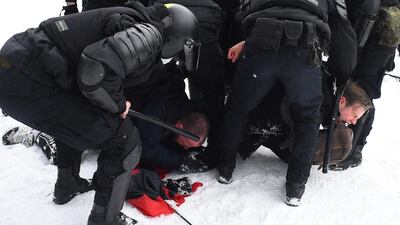Thousands of people took to the streets of Russia on Sunday to demand the release of jailed opposition leader Alexei Navalny.
More than 4,700 demonstrators were detained by police, a monitoring group said.
Authorities tried to stem the tide of demonstrations after tens of thousands of people took part last weekend in the largest and most widespread show of discontent in Russia for years.
Mr Navalny, 44, an anti-corruption investigator and high-profile critic of the Kremlin, was arrested on January 17 after returning from Germany.
There he spent five months recovering from nerve-agent poisoning that he blames on the government. Russian authorities rejected the accusations.
Despite threats of jail terms, warnings to social media groups and tight police cordons, the protests again engulfed cities across Russia’s 11 time zones on Sunday.
In Moscow, authorities closed metro stations near the Kremlin, cut bus traffic and ordered restaurants and stores to close.
Mr Navalny’s team initially called for Sunday’s protest to be held on Moscow’s Lubyanka Square, home to the Federal Security Service, which he claims was responsible for his poisoning.
After police cordoned off the area around the square, the protest moved to another 1.6 kilometres away.
Police were in force there too, randomly detaining people and putting them in police buses. At least 100 were held.
Hundreds of others marched across the city centre, chanting slogans against the President, Vladimir Putin.
The city of Novosibirsk in eastern Siberia hosted one of the biggest rallies, with thousands marching. About 90 protesters were detained.
In the far-eastern port of Vladivostok, more than 100 people were held after protesters danced on the ice and rallied in the city centre.
Mr Navalny’s team quickly called another protest in Moscow on Tuesday, when he is set to face a court hearing that could send him to prison for years.
As part of an effort by authorities to block the protests, courts jailed Mr Navalny’s associates and campaigners in the past week.
On Friday, his brother Oleg, aide Lyubov Sobol and three others were put under a two-month house arrest on charges of breaching coronavirus restrictions during protests last weekend.
Prosecutors also demanded that social-media platforms block calls to join the protests.
The Interior Ministry has issued warnings to the public not to join the protests, saying they could be charged with taking part in mass riots, which carries a prison sentence of up to eight years.
Those engaging in violence against police could face up to 15 years.
Nearly 4,000 people were reportedly detained at demonstrations in more than 100 cities on January 23, and some were given fines and jail terms.
About 20 were accused of assaulting police and faced criminal charges.
Soon after Mr Navalny’s arrest, his team released a two-hour video on his YouTube channel about a Black Sea residence reportedly built for Mr Putin.
The video has been viewed more than 100 million times, helping to fuel discontent and inspiring a stream of memes online.
Demonstrators in Moscow chanted “Aqua discotheque", a reference to a nightspot at the residence, which also has a casino.
Mr Putin says neither he nor any of his close relatives own the property.
On Saturday, building magnate Arkady Rotenberg, the president’s long-time confidant and occasional judo sparring partner, said he owned the property.
Mr Navalny fell into a coma on August 20 while on a domestic flight from Siberia to Moscow. He was transferred to a hospital in Berlin two days later.
Laboratories in Germany, France and Sweden, and tests by the Organisation for the Prohibition of Chemical Weapons, established he had been exposed to the nerve agent Novichok.
Russian authorities refused to open a criminal inquiry, claiming there was a lack of evidence that he was poisoned.
When he returned to Moscow earlier in January, Mr Navalny was jailed for 30 days.
Russia’s prison service claimed he had breached the probation terms of his suspended sentence for a money-laundering conviction in 2014, which he rejected as political revenge.
On Thursday, a Moscow court rejected Mr Navalny’s appeal to be released.
At another hearing next week, his suspended sentence could be changed to one he must serve in prison.

